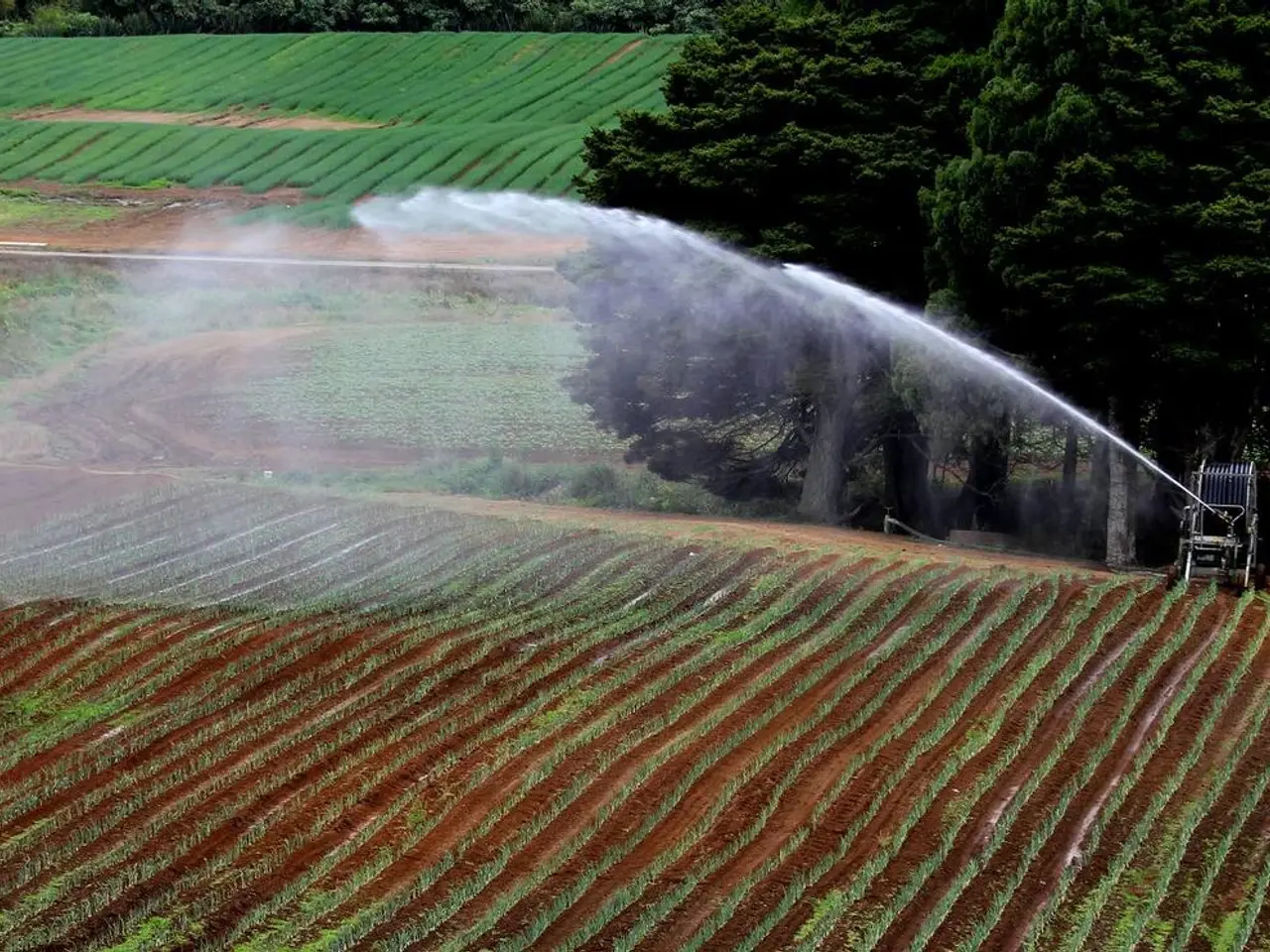Bolstering Agricultural Resilience Against Climate Change: Strengthening Indian Farmers for a Sustainable Agricultural Future
Indian farmers are facing unprecedented challenges due to the disruptive effects of climate change on their crops and livestock. Weather events are causing crop failures, disrupting sowing and harvesting cycles, and worsening water scarcity in many regions.
However, there is hope on the horizon. The National Mission for Sustainable Agriculture (NMSA) and State Action Plans on Climate Change are promoting climate-smart practices and supporting research on resilient crop varieties. This initiative is part of a larger movement towards climate-resilient agriculture, a solution that uses science, local wisdom, and support systems to build farming practices that can withstand the shocks of a changing climate.
Climate-resilient agriculture is crucial for Indian farmers as rising temperatures shorten the crop growing period, reduce grain filling in cereals like wheat and rice, and make plants more vulnerable to pests and diseases. Irregular monsoon rains have become a major concern, either arriving too early and washing away seeds, or too late and damaging the flowering and fruiting stages of crops.
To combat these challenges, farmers can adopt a variety of practices. Organic practices like compost, green manure, and vermicompost improve soil structure and fertility, while minimum tillage practices preserve soil microbes and reduce erosion. Intercropping legumes with cereals naturally fixes nitrogen in the soil, reducing dependence on synthetic fertilizers.
Timely weather forecasts, agromet advisories, and mobile-based apps can guide farmers on when to sow, irrigate, or protect their crops from pests. Farmers can also access subsidies on equipment, irrigation systems, and seeds through Krishi Vigyan Kendras and local agriculture departments.
Awareness and training programs are essential for farmers to understand the impact of climate change and the steps they can take to adapt. Farmers should be trained to conduct soil health tests, understand nutrient deficiencies, and apply fertilizers based on actual crop needs. Avoiding excessive use of chemical fertilizers is crucial for maintaining soil health in the face of climate change.
The Indian Council of Agricultural Research (ICAR) is playing a key role in this transition. Under the National Innovations in Climate Resilient Agriculture (NICRA) project, ICAR has released thousands of crop varieties tolerant to biotic and abiotic stresses, helping crops withstand weather variability. Government schemes like Per Drop More Crop promote drip and sprinkler irrigation to save water and increase water use efficiency at the farm level.
Soil health cards provide farmers with site-specific information on soil nutrient status and fertilizer recommendations, enabling better nutrient management and soil fertility. Integrated farming systems and crop diversification reduce risk and improve resilience. By encouraging multiple crops and integrating trees (agroforestry), farmers can secure water availability and improve resource use efficiency.
Financial and technical support is also available under policies like Paramparagat Krishi Vikas Yojana (PKVY). This program provides incentives for organic farming and climate-resilient practices, including financial aid and training. Traditional water source rejuvenation efforts help recharge groundwater and secure water availability.
These measures are embedded in India’s 2025 agriculture policies, which focus on sustainability and protecting farmer livelihoods amid climate uncertainty. Combined use of scientific advancements, policy support, and local practices aim to empower farmers to manage weather risks and ensure agricultural productivity.
References: [1] Ministry of Agriculture and Farmers Welfare, Government of India. (2020). Climate Resilient Agriculture. Retrieved from https://agricoop.gov.in/climate-resilient-agriculture [2] Indian Council of Agricultural Research. (2020). National Innovations in Climate Resilient Agriculture (NICRA). Retrieved from https://www.icar.org.in/nicra/ [3] National Bank for Agriculture and Rural Development. (2020). Climate Resilient Agriculture. Retrieved from https://www.nbard.org/climate-resilient-agriculture
- To address crop failures due to irregular weather patterns caused by climate change, farmers can utilize timely weather forecasts, agromet advisories, and mobile-based apps to guide their sowing, irrigation, and pest management practices.
- In the face of climate-driven challenges like shortened growing periods for crops and increased vulnerability to disease, farming practices such as organic methods, minimum tillage, intercropping, drip and sprinkler irrigation, and soil health card utilization, supported by initiatives like ICAR's NICRA project and schemes like Per Drop More Crop, are essential for promoting climate-resilient agriculture in India.








